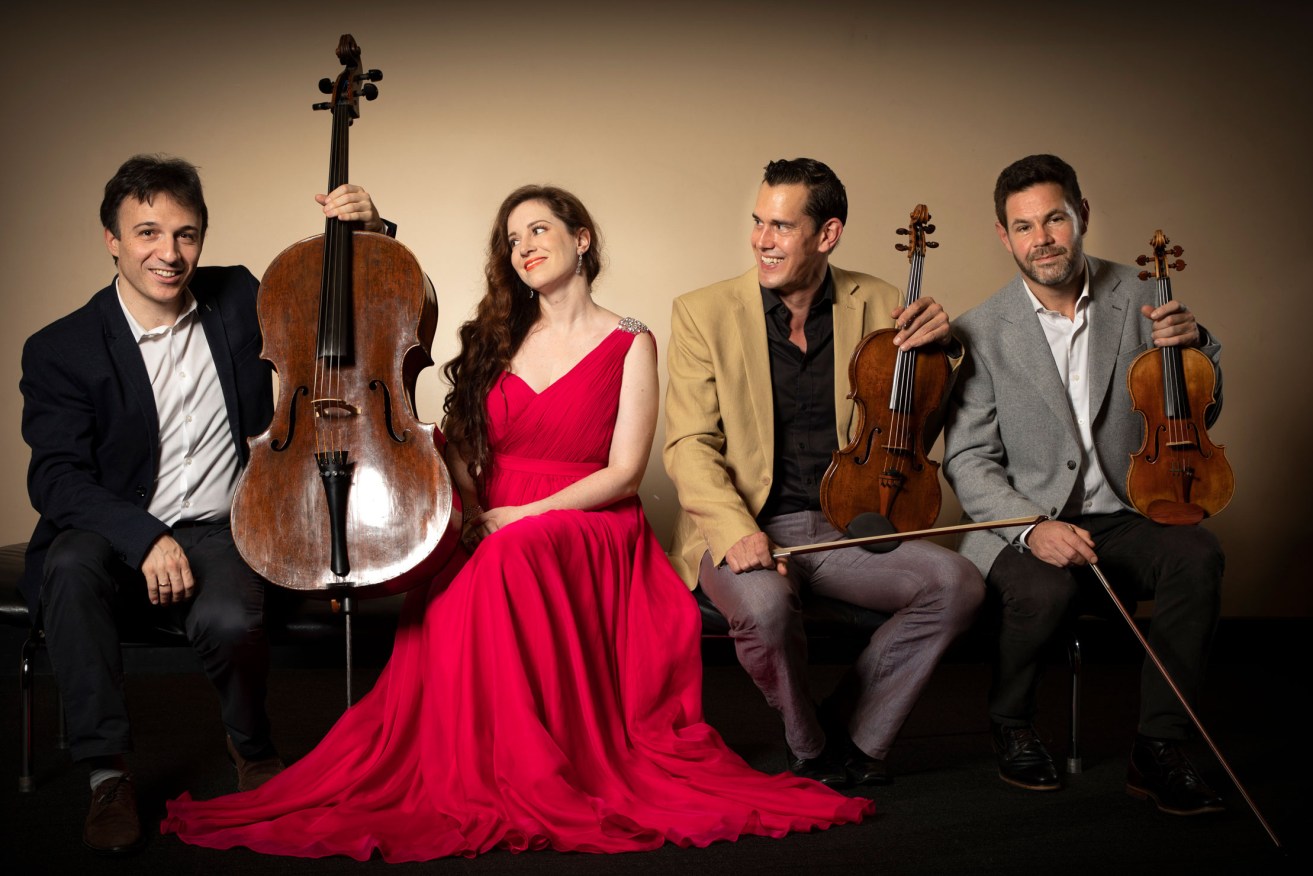Festival review: Coriole Music Festival
How smaller festivals survive in these testing times is one thing, but how they set their artistic sights is another. Having managed to keep going this year, we look at how Coriole Music Festival shaped up.


Umberto Clerici, Lorina Gore, Tobias Breider and Andrew Haveron. Image by Chris Pavlich Photography.
It was only through the goodwill of a group of donors that the Coriole Music Festival ever happened this year. With bookings down on previous years and the whole touch-and-go nature of holding festivals of any kind during these COVID-restricted times, the Lloyd family’s 22 year-old chamber music feast very nearly did not happen. To be sure, catering was spartan this time, and the winery’s Barrel Hall both looked and sounded different due to dozens of kegs having been removed to maximise floor area. But where things mattered – in the concerts themselves – no effort or expense was spared. And in a curious way that can only speak of the resilience of musicians and how they respond to adversity, this year actually saw an intensification of artistic energy.
This was all entirely due to Anna Goldsworthy’s input, who in the capacities of concert programmer, pianist and speaker shared more of her uniquely wide set of abilities than audiences have perhaps seen before. In keeping with Coriole’s longstanding tradition of programming ambitious themes, she set about charting music’s course through the 1920s, 30s and 40s and identifying the multiple stands of modernism that arose in those decades. Illustrating how this happened by way of infusions of blues, jazz, folk music and even Hollywood song, Goldsworthy’s three marathon-length concerts were wonderful and proved beyond doubt that Schoenberg was not the only radical thinker of that era.
With its snazzy jazz rhythms and almost direct channelling of Gershwin, Milhaud’s remarkably quirky Creation du monde set the wheels in motion. In a rarely heard version for string quartet plus piano, the perfromance paradoxically seemed to possess even more colour and vitality. Top-notch violinists Andrew Haveron and Helen Ayres, violist Tobias Breider, cellist Umberto Clerici and pianist Lucinda Collins combined with razor-sharp precision.
Blues and gypsy music were heard even more strikingly in Ravel’s Violin Sonata No. 2, and here the pairing of Haveron and Goldsworthy at the keyboard produced the festival’s most scintillating performance. This fabulously colourful work has a famous moto perpetuo final movement of wicked difficulty, especially if performed at the requisite crotchet equals 152. But being the absolute wizard that he is, Haveron dispatched it with devastating ease and playfulness. Two other astonishing performances were Clerici in Shostakovich’s Cello Sonata, with Goldsworthy again accompanying, and Konstantin Shamray in Rachmaninov’s Variations on a Theme of Corelli.
In an altogether more rapturous vein, soprano Lorina Gore (unforgettable as Ophelia in the 2018 Adelaide Festival’s Hamlet) excelled in Canteloube’s gorgeous Songs from the Auvergne, in a freshly made arrangement with clarinettist Lloyd van’t Hoff, oboist Celia Craig and Collins at the piano. Paring down the composer’s opulent orchestral score to this compact chamber dimension brought many dividends of clarity while allowing all the music’s melodic loveliness and exoticism to shine through.
All these performances were of a level that one can only rarely expect to witness.
Almost the same could be said of the weekend’s crowning work, Messiaen’s epochal Quartet for the End of Time. With an emphasis on precision and extreme drama, the result did not sound particularly characteristic of the composer in a stylistic sense. However, Haveron’s oh-so-gentle violin playing in the concluding ‘Praise to the Immortality to Jesus’ reached an ecstatic height.
Two new works added considerable interest to this festival. The first was Anne Cawrse’s song cycle Flame and Shadow, a work of floating lyricism and truly beguiling beauty; and following that, Holly Harrison’s extremely groovy, jazz-inspired Spitfire was highly entertaining thanks to dazzling clarinet solos supplied by Hoff. Both these composers are amongst Australia’s most exciting new crop of musical voices.
It was gratifying to see Coriole so strongly back in action.




